A remarkable electoral event
- Published
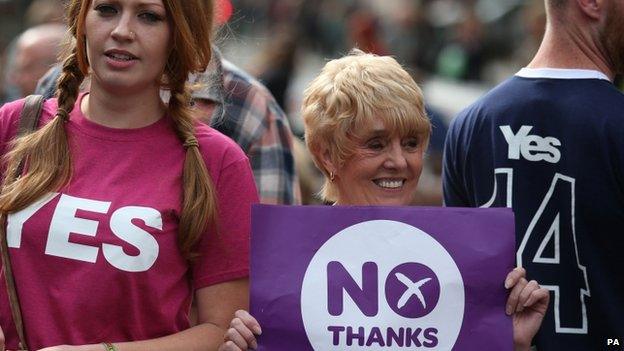
So where are we?
With each side eager to assign gloom and despondency to the other. Chaos, says one. Despair, says the other.
Kipling, I suspect, would have known how to respond. If…..that is, you are seeking answers.
For this is not a wrestling match, evenly matched or otherwise.
It is not a pub quiz between eager champions.
It is not even a talent show with the audience invited to judge.
The campaigns are not incidental. I am not remotely saying that.
However, they are not necessarily entirely seminal in this quite remarkable electoral event.
For, observing those campaigns, heeding them or disdaining them according to taste, are 4,285,323 people in Scotland who have registered to vote.
They will be motivated by a wide range of drivers: their background, their instinct, what they have heard, what they have seen, what they have come to think, what they have come to suspect.
They will be driven by intellectual curiosity, by emotional attachment, by neighbours, friends, family, by whimsy, by caprice, by rigorous examination, by momentum, by stasis.
'Own hands'
The people of Scotland have their own future in their own hands.
Nobody can direct them. Nobody can forestall them.
One senior figure on the "No" side of the argument told me of the onset of personal and political anxiety: a mounting suspicion that the Better Together side sounded remote and elevated while there was a popular discourse taking place in the streets of Scotland, person to person.
That the "Yes" team were engaging in that discourse through community campaigning, allied to a highly visible and colourful presence, which engendered enthusiasm and a sense of common purpose.
Hence, I was told, the "No" side sidelined phone bashing designed to get the vote out. That was happening anyway.
Why waste time trying to persuade someone to participate who is already up for the debate?
Instead, it was suggested to me, "No" should seek to match "Yes" in vigour and street visibility: posters, banners, people.
Secondly, of course, that endeavour was strengthened by external endorsement - or, more precisely, external questions posed towards the "Yes" prospectus.
Hence, the comments from sundry businesses. Which were, of course, entirely voluntary and unprompted.
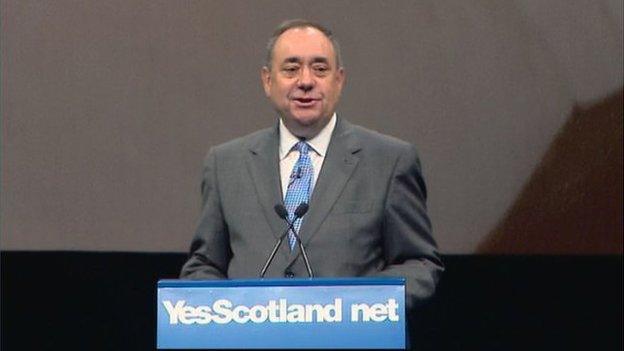
Alex Salmond said Scotland was "rediscovering self-confidence"
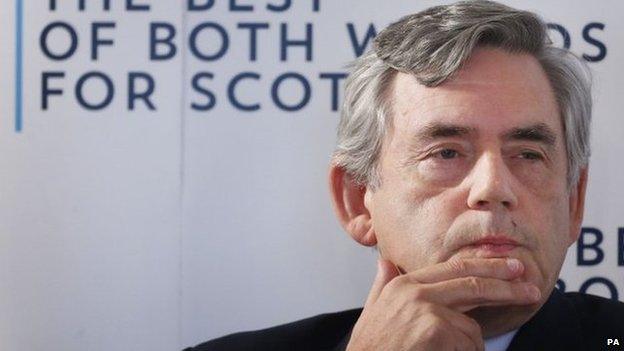
Gordon Brown has argued more tax powers would ensure Scotland could protect the NHS
Do not mistake my point. I am not remotely saying that it is insignificant or wholly tactical that the Royal Bank of Scotland has now joined Lloyds Group in indicating that they would consider moving their headquarters designation to London in the event that a "Yes" vote created uncertainty.
However, Alex Salmond is entirely correct in drawing attention to the statement now issued by Ross McEwan, the chief executive of RBS.
He noted: "This is a technical procedure regarding the location of our registered head office. It is not an intention to move operations or jobs.
"Our current business in Scotland, including the personal and business bank, IT and operations, human resources and many other functions, are here because of the skills and knowledge of our people, and the sound business environment.
"So far, I see no reason why this would change should we implement our contingency plans."
Similarly, Lloyds noted, with regard to their potential plan, that "this is a legal procedure and there would be no immediate changes or issues which could affect our business or our customers."
There are other elements, such as John Lewis Partnership warning of "probable" price rises in Scotland in the event of independence, while supporters of independence say that other retailers have offered a different take.
So we have business anxieties.
But we also have Scottish business leaders - Sir Angus Grossart, Martin Gilbert - variously urging calm and arguing that an independent Scotland could flourish.
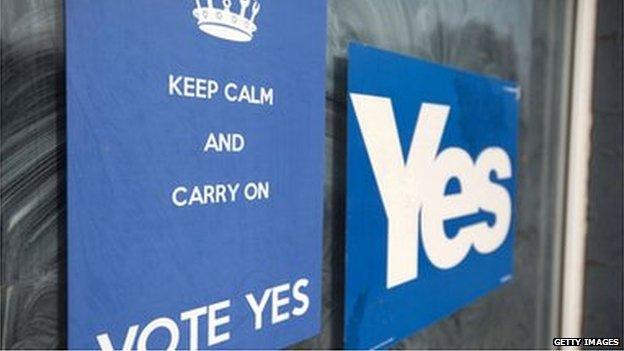
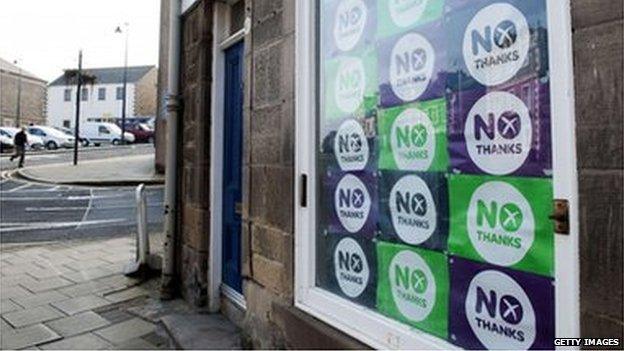
'New powers'
Back to my "No" interlocutor.
It was suggested to me that the offer of a timetable on new powers was significant, that it helped add a positive tone to a narrative which might, otherwise, risk sounding too negative.
Not, of course, that the "negative" will be abandoned. Better Together are, after all, seeking to negate a proposition. It is legitimate, from that perspective, to suggest that there may be flaws in that proposition.
In his speech today, Alex Salmond argued that the popular debate - that demotic discourse - had moved well beyond an offer of more powers.
He said that Scotland had rediscovered national self-confidence, that Scotland, consequently, would vote "Yes".
From the other side, Gordon Brown turned that offer of more powers to pragmatic consideration with regard to an issue which has grown in importance in this campaign: the NHS.
More tax powers, he says, gives Scotland the fiscal clout to ensure that the NHS is protected.
Again, though, the people will decide.
I know I have said that umpteen times. But, in this referendum, it reflects the recreation of a distinctive style of debate.
Forget hectoring. Disown bickering or barter. Engage directly person to person. Cajole, persuade.